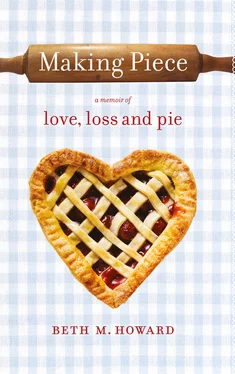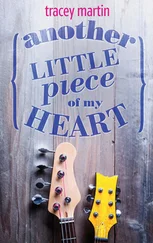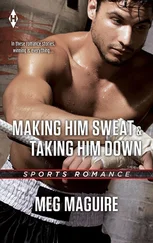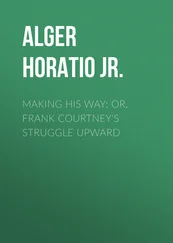Beth Howard - Making Piece
Здесь есть возможность читать онлайн «Beth Howard - Making Piece» — ознакомительный отрывок электронной книги совершенно бесплатно, а после прочтения отрывка купить полную версию. В некоторых случаях можно слушать аудио, скачать через торрент в формате fb2 и присутствует краткое содержание. Жанр: unrecognised, на английском языке. Описание произведения, (предисловие) а так же отзывы посетителей доступны на портале библиотеки ЛибКат.
- Название:Making Piece
- Автор:
- Жанр:
- Год:неизвестен
- ISBN:нет данных
- Рейтинг книги:3 / 5. Голосов: 1
-
Избранное:Добавить в избранное
- Отзывы:
-
Ваша оценка:
- 60
- 1
- 2
- 3
- 4
- 5
Making Piece: краткое содержание, описание и аннотация
Предлагаем к чтению аннотацию, описание, краткое содержание или предисловие (зависит от того, что написал сам автор книги «Making Piece»). Если вы не нашли необходимую информацию о книге — напишите в комментариях, мы постараемся отыскать её.
Making Piece — читать онлайн ознакомительный отрывок
Ниже представлен текст книги, разбитый по страницам. Система сохранения места последней прочитанной страницы, позволяет с удобством читать онлайн бесплатно книгу «Making Piece», без необходимости каждый раз заново искать на чём Вы остановились. Поставьте закладку, и сможете в любой момент перейти на страницу, на которой закончили чтение.
Интервал:
Закладка:
I convinced Susan to let me leave, unescorted, but she wouldn’t release me until I agreed to see her for private grief counseling. “Let’s start with twice a week,” she said. Private biweekly sessions with this cup of comfort? Yes. A thousand times, yes. It was clear that relief wouldn’t come instantly. Like any college degree, it would require hard work. And time. Grief was like deep-dish pie whose filling takes longer to cook; it cannot be rushed. But with Susan—dear, sweet, life-saving Susan—relief felt a little closer at hand.
Even though my desire to be alive, along with my energy level, was at an all-time low, I still had my dogs, Jack and Daisy, and they needed to be walked and fed. I appreciated how Jack could be oblivious to my mood at times, and demand a game of stick throwing. “Keep calm and carry on,” he seemed to be reminding me, like the British wartime slogan.
The dogs forced me to do just that. I couldn’t let them down. I couldn’t let Marcus down. The dogs were Marcus’s dogs, too. He had a lot of time, love and commitment invested in these dogs. He had a lot invested in me. If I was the one who’d died and he was still alive, he wouldn’t bail on life. He wouldn’t wallow in self-pity. He wouldn’t spend time thinking about how he would end it all. He wouldn’t consider the death-wielding potential of a paring knife, my favorite pie-making tool. But I couldn’t help thinking: if I were dead, I could go find Marcus, apologize to him, make love to him, make everything right. It was an attractive theory, but I had no idea if the afterlife actually works that way. There was no guarantee I’d find him, no certainty of a happy ending.
What if he didn’t want me chasing after him? What if he was happy with his independence in his new life? What if he had already hooked up with some new woman—some long-haired brunette in a white chiffon dress with a halo and wings? Then what would I do? I would have left a mess behind for other people to deal with. I would have left two dogs that depended on me, loved me, loved me in spite of my frightening and confusing behavior—my “new normal.”
I had responsibilities, damn it. And taxes due. Besides, I was raised with a strong Midwest work ethic. No matter how down I was, I couldn’t shake the stern voices of my upbringing: “Pull yourself up by the bootstraps.” “Don’t get down, get busy.” “If you don’t have the skills, go get the skills.” And, above all, “No whining.” Those were some of the whip-cracking nuggets of wisdom I was spoon-fed by my parents. I credit my ability to move forward to this hardwiring of tough love. I gave my bootstraps the best tug I could muster and got busy.
This grieving business was like making pie for the first time. One needs some instruction in how to do it—consult a recipe, make a grocery list and go after the goal with gusto. To keep myself organized, I made a list. I could barely get out of bed in the mornings, let alone keep my thoughts straight, but a list gave me some framework, and reminded me that I still had some purpose. After first establishing my grief counseling schedule with Susan, I made an appointment for my thyroid treatment with Dr. Vanek. Check. Next, in between long sessions of sobbing that made going out in public or even talking on the phone problematic, I would look for a place to live.
I was staying with our friends Alison and Thomas in their three-bedroom bungalow. The house was comfortable, welcoming, but it was also where Marcus had stayed during his vacation. His suitcase, filled with his travel clothes, bike gear, books and shaving kit, was still there. His deodorant and German brand of Zahnpasta (toothpaste) were still in the guest-bathroom medicine cabinet.
Seeing his things exactly where he’d left them, knowing he was unaware that he would never touch them again, had initially intensified the sense of loss and, naturally, sent me spiraling into yet another bawling spree. But after the initial shock, I got used to seeing his stuff—I was having to get used to a lot of things—and over the days found some comfort in being surrounded by these pieces of him, particularly his clothes. I searched for anything that hadn’t been washed—the dirtier and mustier, the better. I slept with his red plaid bathrobe pulled close to me, pressing my nose into the fabric to capture any remaining scent of him. I breathed in, long, deep inhales. I couldn’t get enough of his smell, couldn’t get close enough to him.
Apart from being the location of Marcus’s final visit, Alison and Thomas’s house was also where we had stayed during our four-day rendezvous in May. The upstairs bedroom was where we last slept together, wrapped around each other’s warm, naked bodies. It was the last place we made love, the last place we would ever make love. Being in this bedroom was good and bad. Good because in that room I believed I could be connected to him. I had become a recent and voracious fan of Ghost Whisperer, the soon-to-be-canceled CBS-TV series starring Jennifer Love Hewitt.
Besides watching that show, I also went to the Portland library and checked out as many books as I could find about life on the “Other Side.” I was convinced that if Marcus hadn’t “crossed over” yet—or, “gone to the light,” as they said on TV—then he might still be staying in that guest room. He would come and find me, maybe even talk to me, tell me how he was, why he died, tell me if he was angry with me and let me know if he would ever forgive me. There were signs he was there. The books all said ghosts hijack electrical appliances to get energy so they can stick around. Static on my laptop monitor, my iPod shorting out (it had never done that before), and an unusually intermittent Internet connection proved it. If he was hovering around, though, I couldn’t see him. I stayed awake at night, refusing to take the sleeping pills friends insisted I use, so as not to miss him if he appeared.
But staying in this guest room was also bad in a way. My friends were incredibly generous and patient, but I couldn’t stay there forever, waiting for Marcus, or his ghost, to materialize. I had already logged two weeks at their place—on the heels of Marcus staying there for almost three weeks before his abrupt and untimely departure. Not to mention, I wasn’t exactly fun to be around. I’m sure my sobbing was audible throughout the house, my late-night cries echoing off the hardwood floors. I needed to be in my own space, surrounded by my own furniture, my own bedding, my candles, my dishes, my bath towels and especially my pictures—framed pictures of Marcus. So I moved to the next likeliest place he might turn up: our old house on the opposite side of town. It wasn’t exactly our old house. It was the guesthouse next door to that place, and it happened to be for rent.
If Willamette Heights is Portland’s best neighborhood, then Aspen Avenue is its best street. Aspen Avenue is the last street at the top of a small mountain in Portland’s northwest corner, where industrial area meets city meets wilderness. The elevation provides awe-inspiring views of the snow-covered volcanoes Mount Hood and Mount St. Helens by day, and a panorama of city lights by night, a postcard-perfect scene accompanied by the sounds of the occasional blowing train horn or the clash of steel coming from the loading docks down below.
The houses are mostly hundred-year-old huge Victorians, mixed in with newer, smaller, woodsy bungalows. But the selling point wasn’t the houses, the view or the proximity to the boutiques and cafés just down the hill. The draw for Marcus and me when we moved to this neighborhood two years earlier—and one of the reasons I was drawn back—was that Willamette Heights butts up against the five-thousand-acre Forest Park, a lush, dense expanse of woods with forty miles of hiking trails. Trails on which I had before, and would again, spend long hours clad in raincoat and rubber boots, hiking with Team Terrier.
Читать дальшеИнтервал:
Закладка:
Похожие книги на «Making Piece»
Представляем Вашему вниманию похожие книги на «Making Piece» списком для выбора. Мы отобрали схожую по названию и смыслу литературу в надежде предоставить читателям больше вариантов отыскать новые, интересные, ещё непрочитанные произведения.
Обсуждение, отзывы о книге «Making Piece» и просто собственные мнения читателей. Оставьте ваши комментарии, напишите, что Вы думаете о произведении, его смысле или главных героях. Укажите что конкретно понравилось, а что нет, и почему Вы так считаете.












